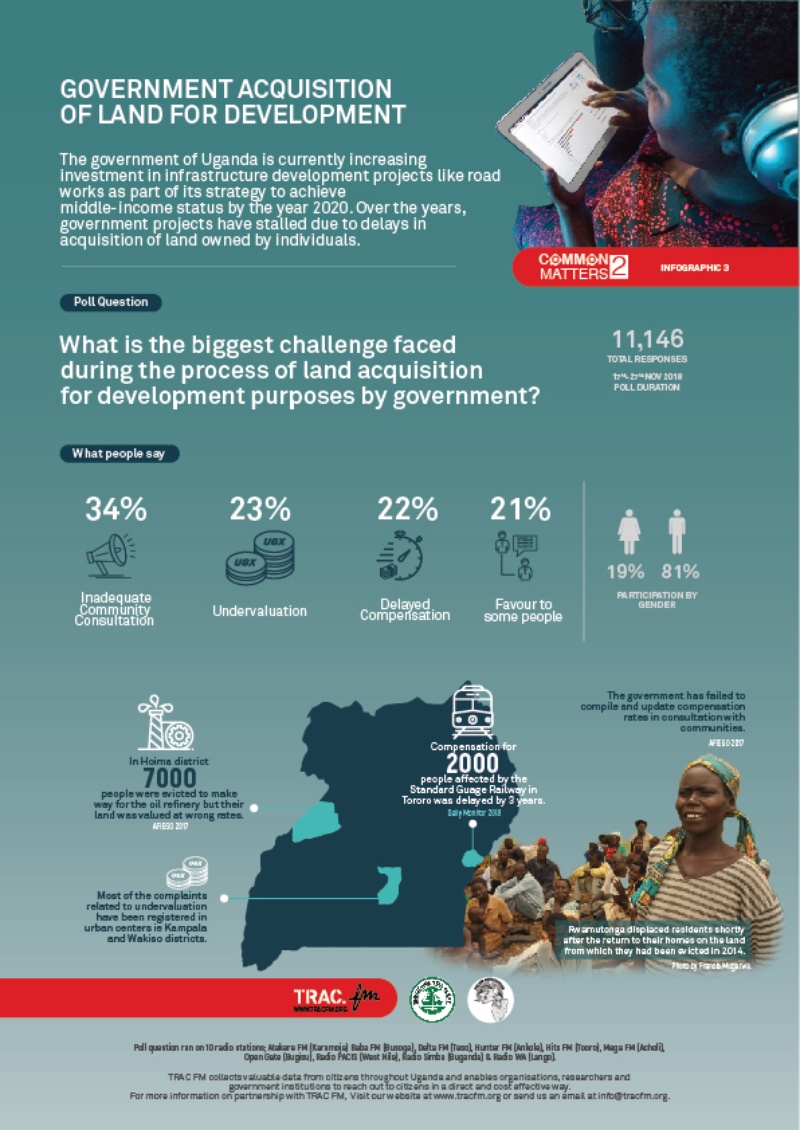The government of Uganda is currently increasing investment in infrastructure development projects as part of its strategy to achieve middle-income status by the year 2020. There are a number of infrastructure development projects nationwide ranging from road construction to railway network, to electricity dams.
These infrastructure development projects have one thing in common. They all require land. Therefore, there is an ongoing process of acquiring privately owned land in order to successfully implement these projects.
In the field of road works and construction, for instance, there are projects, which require the government to, first of all, acquire land. The Entebbe Kampala Express Highway is one of those roads where the government had to acquire privately owned land in advance. But the government of Uganda says that many public works projects have stalled because the Constitution gives too much power to citizens/ residents when it comes to compulsory acquisition of land.
In September and October 2017, President Yoweri Museveni embarked on nationwide radio campaign to sensitize the public about the need to amend Article 26 of the Constitution of Uganda. He said te proposed Constitutional amendment would allow the government to take over private land for public works before compensating the owners citing examples where road works have delayed due to compensation disagreements between land owners and the government.
Prior to the President’s radio talk shows on land, the move to amend Article 26 of the Constitution was widely discouraged and criticized by human rights activists, politicians, and citizens. Critics say that the people who drag government to court over compensation are the few speculators who are connected to powerful people in government and this does not call for a constitutional amendment. However, in his radio addresses, President Museveni argued that this criticism was based on lies.
Groups that are opposed to the amendment of Article 26 argue that this amendment which gives the government power to compulsorily acquire privately owned land prior to fair and adequate compensation erodes citizens’ rights that are enshrined in the Constitution. They add that amending Article 26 is not necessary because section (2)(a) of the Constitution of Uganda allows the government of Uganda to compulsorily acquire privately owned land in order to implement projects for the greater good.
The Constitution of the Republic of Uganda (1995) under Article 26 clearly states the conditions under which the government can acquire privately owned land for development purposes. The constitution states that where land is required for public use, prompt payment of fair and adequate compensation, prior to taking possession or acquisition of the property must be ensured.
Critics of this Constitutional amendment argue that instead of focusing on tempering with Article 26, the government should consider the rights of residents and streamline the process of land valuation and compensation which are mosly flawed.
During our third talk show of our nationwide land rights campaigns, we focused on the issue of land value and fair and adequate compensation in circumstances where the government has to compulsorily acquire land for public works.
At TRAC FM, we continue our commitment to people-centered debates. While we understand that the proposed amendment of Article 26 could indeed ease the process of compulsory land acquisition, we also understand that there are still many challenges in process of acquisition, land valuation and compensation as it is. For instance, on the Entebbe-Kampala Express Highway, there were reports that some of the landowners were paid as little as USD100 to vacate their land. While these citizens might have agreed to that amount, the question remains, was that compensation fair and adequate? There have also been many reports of delayed compensation to persons who have been affected by public works.
The problem is that the government has not shown much interest in addressing the challenges faced by communities in the process of compulsory land acquisition. This is why TRAC FM is organising these talk shows in partnership with land actors to highlight the concerns of the people.
Our poll question for the week assessed the biggest challenge faced by communities during the process of land acquisition for development purposes by the government. Some of the key challenges we identified are listed below:
• Undervaluation
• Favour to some people
• Delayed Compensation
• Inadequate Community Consultation
The data collected from this poll question will be used to support advocacy efforts of land actors in Uganda.
Below is a detailed infographic report of the results with how each region of the country participated in answering this question. Download PDF version.








